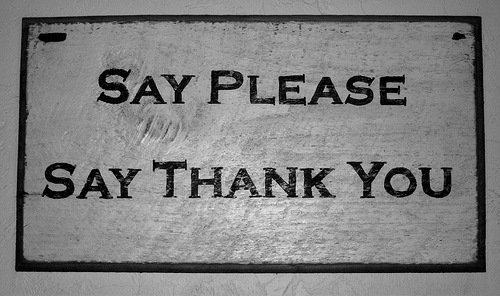
From a reader: ‘I read your recent Life’s a Beach on ‘Manners—Why Bother?’ with great interest. Why do you think some people acquire manners, while others don’t? Even little things, like returning phone calls or emails, or remembering what someone said. Thoughts?’
Manners serve a purpose, like I wrote in that article. The purpose is deeper than surface pleasantries.
Manners are a way to uphold and honor your own choices. Think about it. The friends and lovers you have in your life are there because you chose them. The same is sometimes true of business associates and coworkers, as well.
By treating the people you choose to have in your life with respect, you’re upholding the value of your own choices.
Manners are not taught this way at all. Most people, if they learn to be polite at all, learn it this way: ‘I should be polite and nice. It’s a pain and a drag. But I should do it.’
The world promptly splits into two camps. Those who do what they’re told, even though they know it’s not for their own sake; and those who say the heck with it, why should I do that?
Ridiculous. I’m astonished there are any manners in existence at all. But I think I know why.
Some people figure out, or at least sense—on some unarticulated, subconscious level—that I’m right. That manners are a way of upholding what’s important to you. As a result, they act accordingly. That’s why people with manners—for the right reasons—are sometimes some of the best people to know. Because they really are living by some sort of values, for their own sake most of all.
People who have a pride in themselves are the ones who tend to be most nice and polite. It’s kind of like cleaning your house. You could sweep all the dirt under the carpet or the throw rug. ‘Nobody who visits will notice.’ That’s probably true. But YOU will know; that’s why you don’t do it.
Manners are a form of professionalism applied to all of life. You’re polite, if you are, because you like the way you present yourself and take pride in it. It’s more than you desire to make the world a better place. You desire to make your world—your benevolent, uplifting kind of world (if that’s what you value)—a better and more real place. As a result, you treat it that way.
Manners have nothing to do with selflessness, not at all. When I encounter rudeness in someone, it leads me to think or conclude, ‘This person doesn’t really value life on a very high level.’ Some people, as we all know, go through life bitter or envious, with a proverbial psychological chip on their shoulders. Manners are often not present in such people, other than (at best) a memorized obligation. Hostility and resentment lurk beneath a very thin psychological surface in such people, and once you find this out, their manners are meaningless.
The little things—like returning phone calls, not interrupting people, and treating important people as if they’re visible and valuable are very important. Cumulatively, they add up to much of life.
It shouldn’t take a disaster, a loss or a terminal illness to make you appreciate the people you value enough to respect and honor them. In so doing, you’re honoring your life and yourself.
